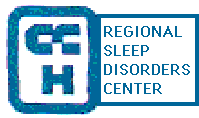Since people can tell what is happening to them when they
are fully awake, doctors usually can sort out the cause of this difficulty
simply by talking with the patient. Possible specific factors include
the following:
-RESTLESS
LEGS SYNDROME involves an unpleasant, nervous or "antsy" sensation
in the legs, relieved by walking, but prominent when inactive
and trying to fall asleep. It can "run in families" and
sometimes is related to kidney failure, peripheral neuropathies
and other disorders. Most patients with RLS also have "Periodic
Limb Movement Syndrome (PLMS) " (see
below).
Even
minute amounts of caffeine can worsen RLS and caffeine should be
totally avoided. RLS is often related to even borderline low body
iron stores, and it is advisable to have your doctor check a special
blood test (serum ferritin level). If the result is less than 50,
oral iron may be very helpful. One should not simply take iron without
checking this level, since it is possible to overload the body with
iron.
Treatment
of RLS can be very difficult. Some patients respond to gabapentin
or low dose opiates such as codeine. Drugs that are usually given
for Parkinson's disease are typically extremely effective initially
but in many cases, their use over time results in a phenomenon called
augmentation (with worsening of the RLS symptoms to a degree worse
than before treatment was begun: often with occurence of symptoms
earlier in the day and with spread to the arms and upper body. Sinemet
(carbidopa/levodopa) is particularly likely to cause augmentation.
The same problem can occur with other anti-Parkinson drugs such
as Mirapex and Requip. A similar drug, cabergoline (Dostinex), which
is used in the US primarily for treatment of prolactin-secreting
pituitary tumors may be less likely to cause augmentation. Many
other drugs have been tried with variable results.
-PSYCHOPHYSIOLOGICAL INSOMNIA involves
worrying about being able to fall asleep to the point it keeps one
awake!
-INADEQUATE SLEEP HYGIENE: such
as overuse of caffeine, napping, vigorous exercise too close to
bedtime and erratic sleep habits.
-ADJUSTMENT SLEEP DISORDER refers
to temporary insomnia difficulties, related to acute stress, conflicts
or environmental change. It may also may involve sleep disruption
with early awakenings.
-CHRONIC USE OF SLEEPING PILLS, STIMULANTS
OR ALCOHOL.
-PHYSICAL DISCOMFORT: for
example, chronic pain or shortness of breath.
-ANXIETY AND MOOD DISORDERS can
also interfere with sleep onset or ability to "stay asleep".
-DELAYED SLEEP PHASE SYNDROME. Some
people are "night owls" whose "internal clocks" are not synchronized
with the normal schedule in our society. Such people may be able
to fall asleep and wake up readily only at times that are incompatible
with a conventional day-shift schedule. For example, they may not
fall asleep easily until 4 a.m., but then cannot wake up and feel
well before noon. Exposure to special bright lights at specific
times frequently helps reset the internal clock to a more normal
schedule.

